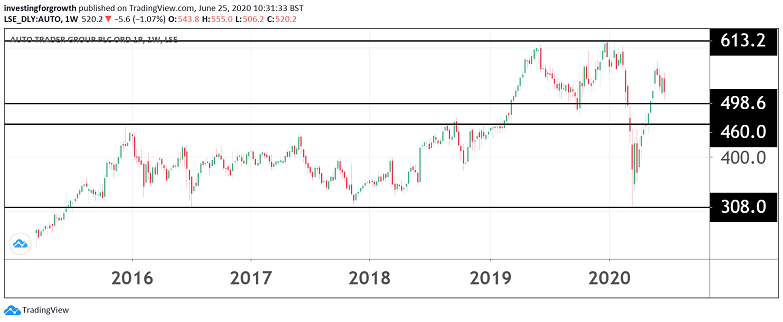Auto Trader prepares to kickstart growth
Lockdown came at a particularly bad time for the motor industry, but our head of markets sees potential.
25th June 2020 10:49
by Richard Hunter from interactive investor
Lockdown came at a particularly bad time for the motor industry, but our head of markets sees potential.

Online motor marketplace Auto Trader (LSE:AUTO) had been gently accelerating in the period covering these numbers, but ground to an abrupt halt as the pandemic resulted in the closure of car showrooms.
Revenues had risen by 3.9% (and average revenue per retailer, an important metric, by 5.7%) in the year ended 31 March 2020, with pre-tax profit advancing 3.8%. An impressive operating profit margin also nudged higher to a level of 70%, while net debt was also reduced to £275 million from a previous £307 million.
Unfortunately, lockdown came at an especially poor time for the industry, with March usually being the highest month for new car registrations. The company quickly moved to shore up its finances, with a fundraising of £186 million in April immediately strengthening both the balance sheet and liquidity.
At the same time, Auto Trader also made other financial adjustments. The decision not to pay a final dividend has been taken disappointingly, although a previous yield of 1.3% was not a particular attraction and is a prudent move in the circumstances. Indeed, this saving of £43 million was further bolstered by the suspension of the share buyback programme (£62 million) and a deferral of VAT payments (£18 million).
Since car showrooms were reopened at the beginning of June, an element of pent-up demand has been in evidence. Visits to the website, which had declined in April and May by 32% and 7% respectively, showed a June increase of 28% year-on-year. Estimated revenues for the first quarter will be sharply lower, partly due to the discounts being offered to its main clients as well as a reduced marketing budget, while net bank debt has been reduced further to £80 million, given the financial leeway the company has engineered.

Source: TradingView. Past performance is not a guide to future performance.
The majority of the metrics in the full year numbers continue to reflect Auto Trader's powerful position within its sector, which in turn ratchets up the pressure on its competitors due to its pricing power.
At the same time, the company is able to generate significant amounts of cash partly due to its cost-effective online nature, which should help a return to some kind of economic normality when conditions allow.
Auto Trader has had a good run of late, with the shares having risen 31% over the last three months and 41% since the March lows. Over the last year the move is more pedestrian, with a decline of 8% comparing to a drop of 18% for the wider FTSE 100 index.
The company is undeniably well-placed, particularly if the car trading business becomes more digitalised in a post-pandemic world. However, in the midst of what is likely to be a deep (but hopefully brief) recession, what is less clear is consumer propensity to spend on new cars.
As such, the growth engine which Auto Trader has symbolised to date could be rather more difficult to restart. The general view of the shares is broadly positive, with the market consensus currently standing at a ‘cautious buy’.
These articles are provided for information purposes only. Occasionally, an opinion about whether to buy or sell a specific investment may be provided by third parties. The content is not intended to be a personal recommendation to buy or sell any financial instrument or product, or to adopt any investment strategy as it is not provided based on an assessment of your investing knowledge and experience, your financial situation or your investment objectives. The value of your investments, and the income derived from them, may go down as well as up. You may not get back all the money that you invest. The investments referred to in this article may not be suitable for all investors, and if in doubt, an investor should seek advice from a qualified investment adviser.
Full performance can be found on the company or index summary page on the interactive investor website. Simply click on the company's or index name highlighted in the article.